Wondering how to develop a custom billing software? You are not alone. The digital-first era of today has led to the development of modern billing systems that go way beyond spreadsheets and simple applications for creating invoices.
The market size of the global billing & invoicing software in 2024 was approximately $4.83 billion, and is expected to grow to $5.43 billion in 2025, reaching $13.94 billion by 2033. Such development demonstrates a definite trend towards business-specific and customized billing systems.
Modern billing is not anymore about sending invoices. It is now subscription management, automated tax compliance, multi-currency support, CRMs and ERPs integration. Billing software development has evolved as a backend service to a business enabler.
Firms that have been using manual spreadsheets are now adopting AI-driven platforms. In the future, companies that invest in smart and scalable billing infrastructure are in a better place to respond, compete, and thrive.
Custom billing software is a specialized solution built as per the requirements of a particular business in terms of billing, invoicing, and payments. It is not a generic or off-the-shelf billing tool that you will have to adapt to the workflows, compliance requirements and customer preferences of your company.
It enables you to automate the tedious billing work, minimize the number of errors, and also integrates with your existing CRM, ERP or accounting systems.
Depending on the type of business, the billing needs might differ to a considerable extent. Different industries are in need of specific solutions, with subscription management and usage-based payment processing being the key areas.
The most famous types of custom billing software are listed below, and each has its own set of billing models and business processes.
This kind of custom billing software would be ideal for companies that have recurring services, such as SaaS platforms, gyms, or digital content providers. It automates billing of invoices with consideration of billing cycles such as weekly, monthly and annually.
Options such as proration, auto-renewals, trial periods, and a customer self-service portal make it the best tool to handle intricate subscription models in an efficient manner.
Retail billing software serves stores, supermarkets, and e-commerce companies that require real-time sales and inventory management requirements. It facilitates barcode reading, GST/VAT computations, POS integration and receipts printing.
Custom billing software for retail offers features such as discount processing, loyalty program support, and support of multiple terminals, which allow retail to run smoothly on a daily basis.
This type is utilized by water, gas, internet, electricity suppliers, and calculates billing based on usage by incorporating smart meters or manually input readings. It offers slab-wise pricing, late fee policies and multiple-cycle billing.
Government subsidies, energy credits, and banking system integration are also made possible through this custom billing software to facilitate payments smoothly for customers.
The healthcare billing systems are targeted at clinics, hospitals, and diagnostic labs. They integrate with the Electronic Medical Records (EMRs) and automate patient billing, insurance claims, co-payments and reimbursements.
This invoice software development is HIPAA-compliant and able to support complicated workflows such as pre-authorization, ICD/CPT coding, and tracking patient history.
Custom online billing software is useful to schools, colleges and training centers to manage tuition fees, admission charges, library fines and exam fees. It allows semester billing, scholarship changes, installment payments, and SMS/email due date reminders.
Integration with student portals and ERP systems allows the staff and parents to be better informed about their finances and manage them conveniently.
This software is specifically designed to suit the needs of shipping companies, courier services, and fleet operators, and it charges according to the weight, distance, delivery time, and type of the package. It has freight invoices, fuel surcharge calculations, and real-time tracking.
Logistics custom billing software automates the billing process, enhances billing accuracy, efficiency and transparency of billing clients and paying vendors.
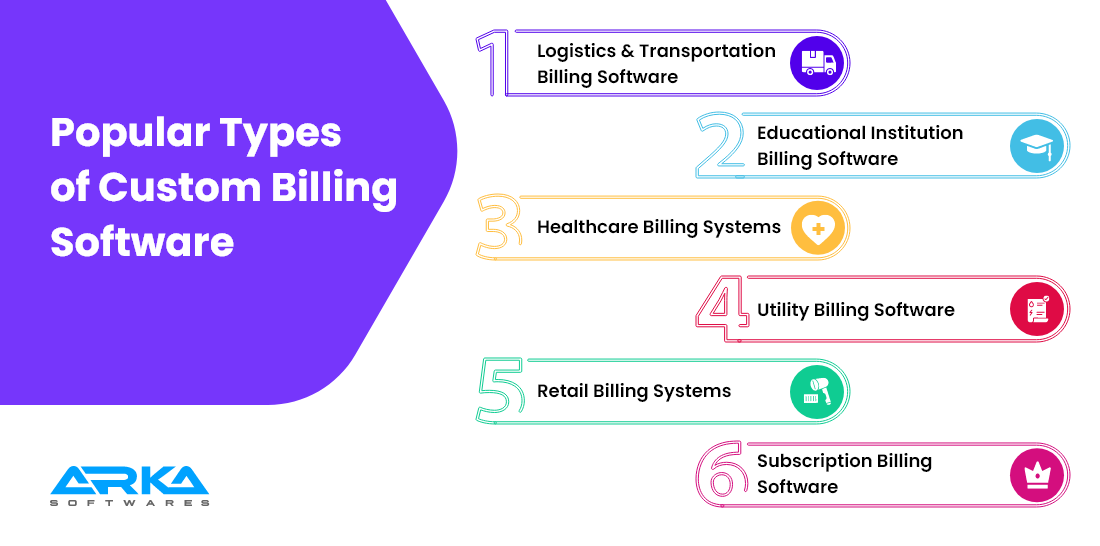
Beyond a personalized invoicing system, the investment in the custom billing software gives business a basis of operational efficiency, long-term scalability and enhanced customer experiences. The following are the main benefits that businesses experience when they decide to develop custom billing software rather than opting for generic and one-size-fits-all solutions.
Custom billing software is tailored to the way your business works. It supports individual billing cycles, approval procedures, and user hierarchies as opposed to the one-size-fits-all platforms.
This guarantees the software is easy to incorporate into your everyday routine, minimizing manual data and maximizing precision, which in turn helps make smarter financial choices and streamline teamwork.
When you develop custom billing software, scalability is one of the essential benefits. As your business grows, either by new markets, customers, or services, the system evolves as well.
There are no performance drops when scaling features, users, and data volume.
This means that you will never be restrained by the tool itself, which makes your billing software development future-flexible and highly responsive to expansion.
The initial custom billing software development cost may be more but the ROI over the long run can be enormous. You do away with recurring license fees, minimize manual inaccuracies, and expensive integrations or feature restrictions.
In the long run, the customized performance and productivity may enable tremendous cost savings in operations and a short break-even period.
Among the many benefits of custom billing software for business is the ease of integrating it with your other tools whether that be your CRM, ERP, or accounting software. This makes the data consistent, and enables cross-platform automation.
Integrations are specific to your tech stack, which alleviates many compatibility problems that can exist within off-the-shelf billing software solutions.
Invoice software development allows you to introduce powerful and real-time reporting dashboards to help you keep track of billing trends, revenue flows, and client payment behavior.
These insights will be important in making informed decisions, growth predictions, and gaps in your payment cycles or revenue sources. Even recurring financial reports can be automated.
Billing software automation guarantees quicker processing, less mistakes, and improved communication. The clients are allocated custom invoices, reminders, and the ability to view payment histories through self-service portals. Your business may look more professional and trustful with such capabilities, which helps to increase customer retention and cash flow management.
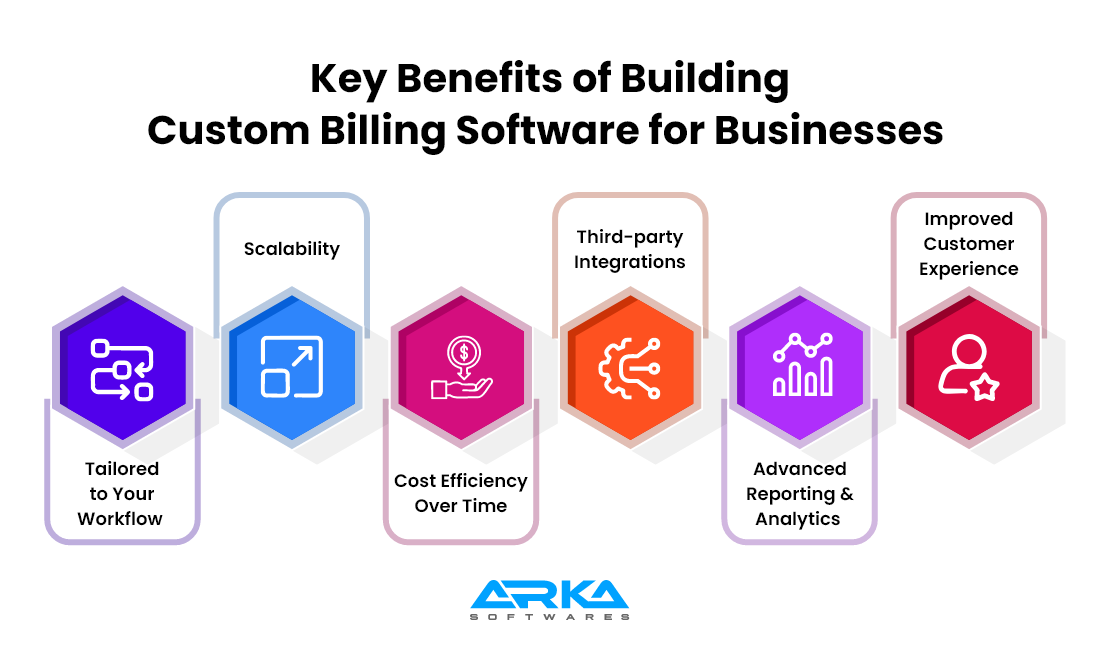
As you develop custom billing software, its success depends on the quality and relevance of the features. An excellent billing system must not be limited to a mere invoice generator but must have automation, compliance, scalability, and smart decision-making. The following are the essential features that make the custom billing software effective.
This aspect allows the system to create and dispatch the invoices automatically, depending on the previously set rules like regular cycles or action-driven invoices. It saves a lot of manual labour, eliminates human error and customers are billed in due time, which is beneficial to the flow and efficiency of operations.
You can allow flexibility to your clients by integrating with various payment gateways such as Stripe, PayPal, Razorpay or local banks.
This guarantees quicker transactions, less delays in payments and the ability to receive payments in different currencies worldwide, which is important to businesses that have customers across the globe.
Tax (e.g. VAT, GST, sales tax) is automatically calculated in this module depending on the location and billing rules.
It guarantees tax compliance, eases auditing, and lowers risks of financial disparity. You can also create tax reports to file with accounts or the government.
An essential feature to a SaaS or membership-based business, this will automate the billing cycle of a product, whether weekly, monthly, or annually.
It supports renewals, upgrades, downgrades, and cancellations, making the process seamless for your company and customers.
An efficient custom billing software must process international transactions. The ability to support more than one currency and language allows it to better serve clients in various geographies, providing a better user experience and allowing easier management of international tax.
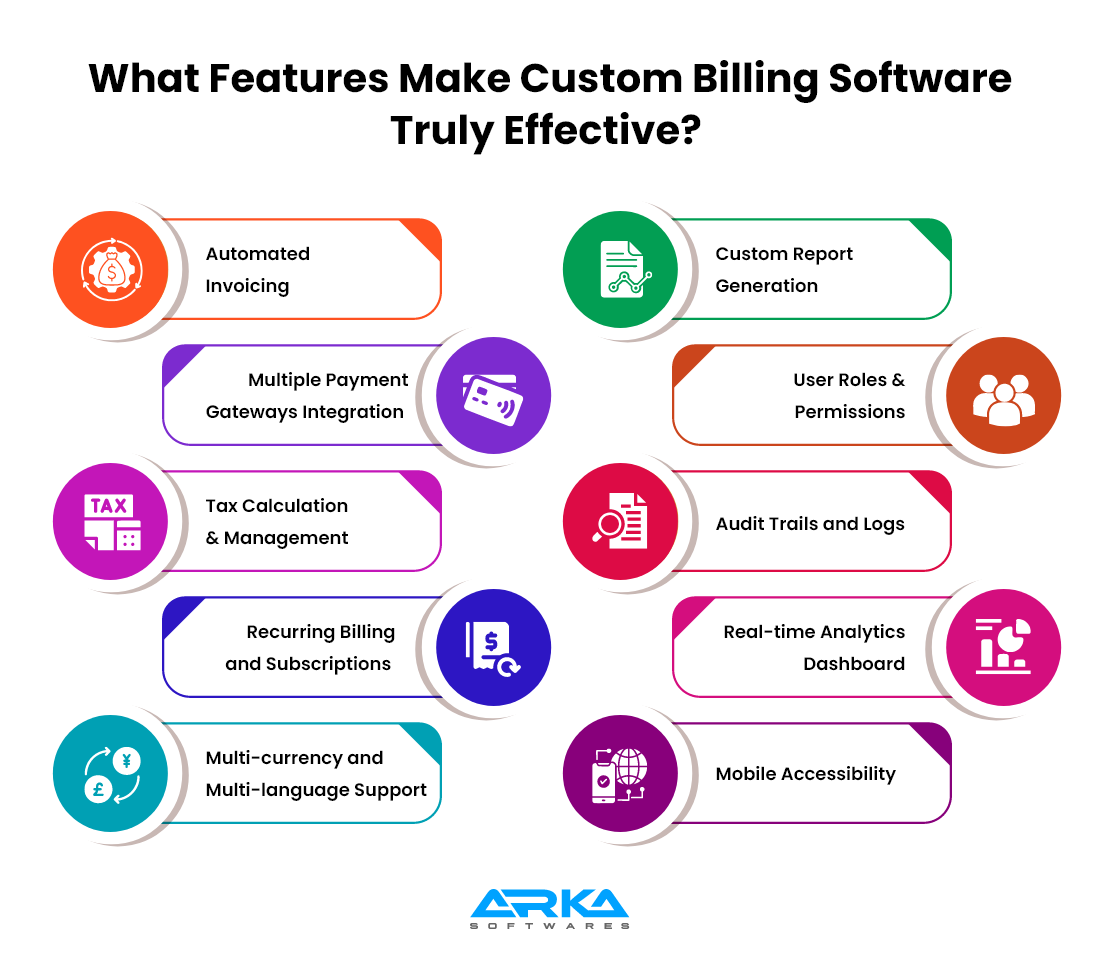
When you develop invoice software, report generation enables creating dynamic reports by using filters such as date, client, invoice status, revenue or tax.
It assists in providing stakeholders with information regarding financial well-being, predicting revenues, and making evidence-based decisions.
Role-based access is a way of protecting sensitive billing data and making it accessible only to authorized individuals.
Admins are able to create job descriptions like finance manager, sales executive, or auditor, and therefore enhance data security and uphold accountability at the departmental level.
Accountability and compliance are important features that require tracking of user activities like logins, edits and transaction histories.
Audit logs are used to identify anomalies, avoid fraud, and leave traceable audit records in case of an audit or dispute.
An easy-to-understand dashboard provides an up-to-date overview of KPIs, including unpaid bills, monthly turnover, and late payments. This assists finance teams to work faster and also provides business leaders with a greater insight into cash flow and customer payment patterns.
Being able to access your custom billing software through mobile means business continuity anytime, anywhere.
Be it reading the reports or sending invoices, a mobile-friendly interface can enable teams to handle the billing tasks remotely, making them more flexible and responsive.
Development of an effective custom billing software solution involves more than coding. It involves comprehension of business requirements, user experience, technical architecture, and scalability in the long term.
This is an in-depth explanation of the steps to develop custom billing software.
This is the first step to create billing software. At this stage, the stakeholders determine the exact requirements of the business, type of users, billing instructions, and legal regulations.
This is aimed at capturing both functional and nonfunctional requirements that will determine the whole development process.
A user-friendly interface increases user efficiency and minimizes training. Designers develop user-friendly wireframes and customer-driven workflows depending on the operations of your business.
In this phase of billing software development, branding, accessibility and usability is emphasized. Early feedback on design allows optimizing the experience prior to writing any code.
The performance and scalability are affected by your technology decisions.
Common stacks for building billing software would be React or Angular on the frontend, Node.js or Django on the backend, and PostgreSQL or MongoDB for databases. Scalability is supported by cloud platforms such as AWS or Azure.
Creating a Minimum Viable Product (MVP) will enable you to test your idea in a short time. It has essential components such as client management, invoice creation, and recording of payments.
The MVP model results in quicker time to market, and minimizes initial billing software development costs. It also assists in obtaining real-time feedback regarding your customized billing software development roadmap.
After validating your MVP, additional features such as tax configuration, multi-currency, automatic reminders, and payment gateway are included. This step enhances the functionality of your billing software and makes it more user-friendly.
The availability of third-party integrations with CRMs, accounting software, and other applications improves the overall worth of your billing software solutions.
Comprehensive QA testing will make sure your software works perfectly in a real-life scenario.
These consist of unit, integration, performance and security testing. QA is an obligatory component of the billing software development services, allowing you to avoid expensive problems after launch. It is also necessary in industries that may need financial and data protection compliance.
The tested software is then released into a production environment, most often through a secure cloud environment. The training sessions will assist internal users and admins in familiarizing themselves with the system.
Be it an online billing software for small business or enterprise-level implementation, onboarding is the key for a seamless transition to the new platform.
After launch, the software has to be maintained to address bugs, apply security updates, and increase performance. New features can be added as the business requirement changes.Custom software development services are a good investment to make your system reliable, scalable and future-proof.
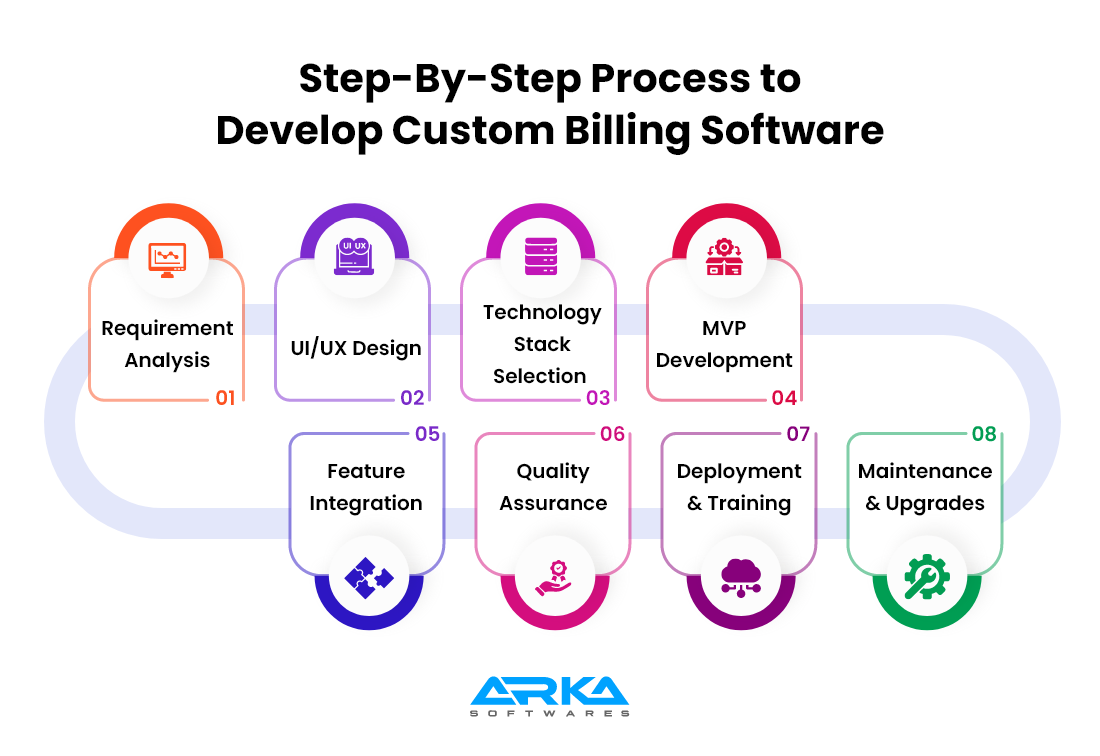
You need to comprehend what the market-leading platforms can do before you develop custom billing software. These are powerful references to consider when designing your own custom billing software.
FreshBooks is highly renowned in the freelance community, among small businesses, and agencies. It is an online billing software for small businesses that includes automated invoicing, time tracking, expense management, and payment processing.
FreshBooks is a good beginning point for businesses that seek streamlined functionality, but it is not highly customizable and therefore not the best fit for complex billing operations.
Zoho Invoice is a cloud-based product with no cost, which suits small to mid-sized companies. It also allows users to issue professional invoices, automated reminders, receive online payments and produce detailed financial reports.
It fits perfectly into the Zoho ecosystem and is especially helpful when a company already utilizes other Zoho applications.
Nonetheless, businesses demanding flexible and complicated processes of workflow might ultimately necessitate custom billing software development to achieve greater adaptability.
QuickBooks Online has a very wide selection of billing software solutions bundled in a robust accounting system.
It assists in invoice management, expense tracking, payroll processing and real-time financial analysis.
That being said, QuickBooks is limited in cases when very specific or unique billing processes are required, and customization is paramount.
Xero is a contemporary, cloud-based accounting and billing automation software that is especially good at usability and collaboration. It facilitates invoicing, inventory, payroll and even multi currency billing, which is great to have in case of international operations.
Although flexible in terms of general usage, companies that have identified special integration requirements or compliance requirements might be forced to transition to custom billing software.
Chargebee is a high-end product that suits SaaS and subscription-based business. It supports recurring billing, usage control, revenue recognition and is integrated with the most popular CRMs and ERPs.
Being highly feature-rich, it is not always possible to customize it further to some extent, and in some cases, it might be necessary to employ a billing software developer to exercise full control over the user experience and backend logic.
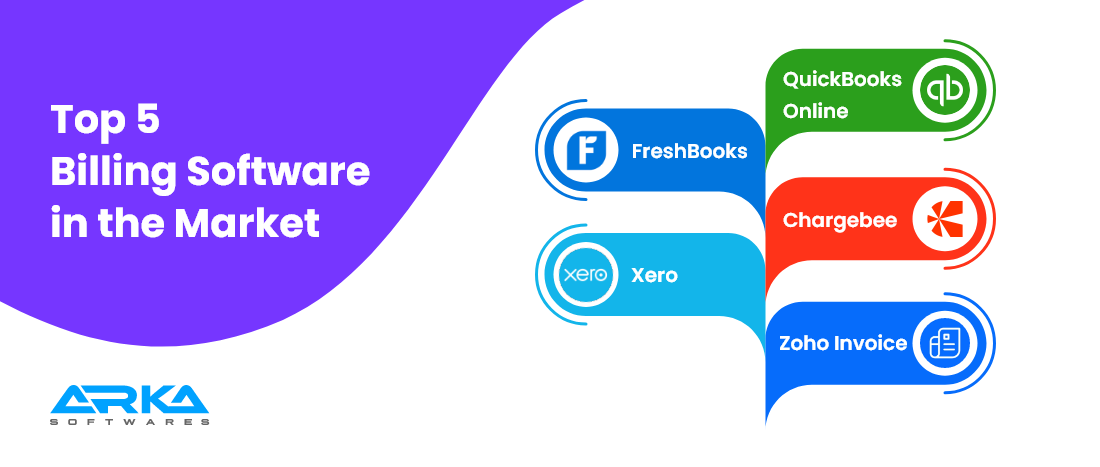
Custom billing software development cost will depend on the scope, technology and region. This is the broad summary. Here’s a general breakdown.
| Factor | Estimated Cost (USD) |
|---|---|
| Requirement Gathering | $2,000 – $5,000 |
| Design | $3,000 – $7,000 |
| MVP Development | $10,000 – $30,000 |
| Full-Scale Development | $25,000 – $100,000 |
| Testing | $3,000 – $10,000 |
| Maintenance (annually) | 15–25% of development cost |
Thus, the cost to create custom billing software may vary between $20,000 and 100,000+. Take into consideration the software maintenance cost as a long-term sustainability factor.
The decision to use custom billing software or off-the-shelf solutions is one that may have a tremendous effect on your operations, scalability, and bottom line. Though off-the-shelf software can be installed in no time, customized billing software development will support your individual business requirements.
To assist your decision-making, consider the key highlights of the comparison.
The initial cost of developing a custom billing system is usually between $20,000 and $100,000 or higher. Nevertheless, it can be cost-effective in the long term in terms of automation, integration and license-free scaling.
Off-the-shelf tools are low cost to enter and have predictable monthly costs. However, extra costs on add-ons, user expansion, and third-party integration can add up to a considerable amount in the course of time.
When you develop custom software, you can personalize features, logic and design to your exact requirements. It is customized to your needs, including multi-currency support, custom tax logic and more. This makes sure that the solution fits your business model, not vice versa.
Off-the-shelf tools, on the other hand, do not give access to any customizations beyond templates of invoices or user permissions. In businesses that have distinct operational flows, this restriction may result in inefficient workarounds and mismatch of processes in the long-term.
A custom billing software can be built to grow with your company. As you grow to new markets, new services, or increased transaction volumes, your system grows with you, with no performance problems or vendor limitations.
Off-the-shelf software can be scaled only up to a point, usually defined by price points. After you pass certain thresholds, you might find slow performance, forced upgrades, or having to switch to an entirely different platform.
Custom solutions are able to integrate with your current technology without friction, whether that is your CRM, ERP or industry-specific applications. By leveraging offshore software development, it is possible to create APIs that perfectly match your infrastructure so that data flow and operational consistency are maintained.
When you use off-the-shelf billing tools, the typical integrations available to you are just with more common applications. Niche systems or legacy software usually necessitate expensive workarounds, or fail to integrate completely, creating data silos and manual work.
We understand that no business is the same as far as its billing needs are concerned. That is why we do not provide generic platforms; we collaborate with you to offer highly secure, scalable, custom-built billing software unique to your operations. This is how our services bring practical value to each step.
We handle every phase of the project—from requirement analysis and UI/UX design to full-stack development and deployment. Whether you want to create billing software for internal use or customer-facing platforms, our team ensures a seamless build process tailored to your workflow, compliance needs, and growth plans.
A user-friendly interface can enhance adoption a hundredfold and reduce training. We develop user flows, dashboards and mobile friendly designs that allow easy navigation throughout your customized billing software.
All our interactions are designed to be usable, fast, and consistent with the brand.
Your billing information has sensitive personal and financial data. We apply enterprise-level security features including role-based access, secure APIs and encrypted transactions.
We also make sure your system is compliant with regulations such as GDPR, HIPAA or PCI-DSS, depending on your geographical location and business.
We offer ongoing software maintenance for business systems to ensure they run smoothly, stay secure, and remain up to date. From performance tuning to feature upgrades and bug fixes, our support helps you protect your investment and respond quickly to changing needs or market demands.
Custom billing software is more than a tool; it’s a strategic asset. By tailoring the billing system to your exact business processes, you eliminate inefficiencies, reduce manual tasks, and ensure compliance with industry regulations.
This leads to faster invoicing, quicker payments, and improved customer satisfaction.
In a world where financial accuracy and operational speed are key, developing custom billing software empowers businesses to stay ahead of the curve.
Instead of adapting to software, you let the software adapt to you. It’s about building smarter systems that free up time and resources—so you can focus on growth, not paperwork.
Depending on complexity, it can take 2 to 6 months for a functional MVP and up to a year for a full-scale solution.
Absolutely. We specialize in migrating legacy systems into scalable custom billing software for businesses, preserving essential data and improving performance.
SaaS, healthcare, utilities, retail, education, and professional services see the greatest ROI from customized billing software development.
We use modern stacks like MERN (MongoDB, Express, React, Node.js), Django + PostgreSQL, and cloud platforms like AWS. These ensure security, performance, and scalability in invoice software development and billing software solutions.